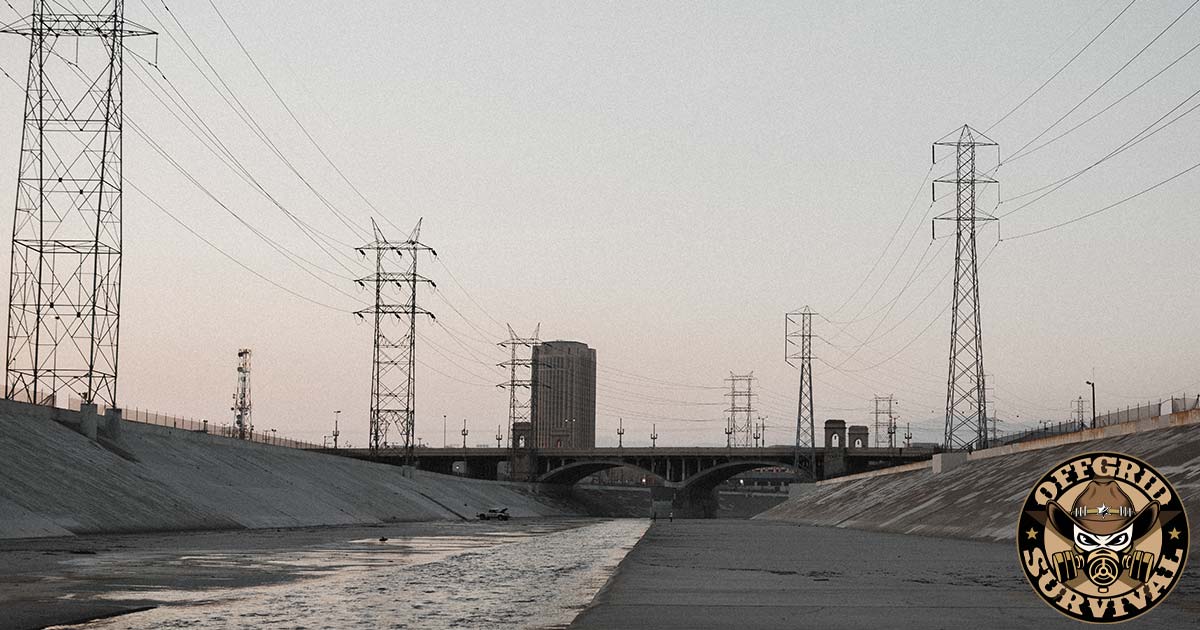
Having a plan of action is critical during any survival situation, but surviving in an urban environment during a long-term disaster will require a different kind of thinking and skillset and a well-thought-out Urban Survival Plan. When disaster strikes and the urban jungle grinds to a halt, knowing how to find food, water, and other essential supplies will be a bit different in a big city.
While your emergency food and water stockpile will sustain you during most disasters, a comprehensive plan to find additional resources during a long-term survival situation is vital for those living in heavily populated urban areas. With careful preparation and an intimate understanding of your city’s surroundings, you can secure everything you need, even in the heart of a busy city.
During your planning, you need to put some serious thought into how you will resupply your stocks during extreme crisis situation. If you live in rural areas of the country, that’s probably going to be a lot easier than it will be for someone living in an urban environment. That being said, there are ways to sustain yourself even in an urban setting – if you plan ahead, and if you know where to look.
Urban Survival Plan of Action: Food & Water Sources During SHTF Disasters
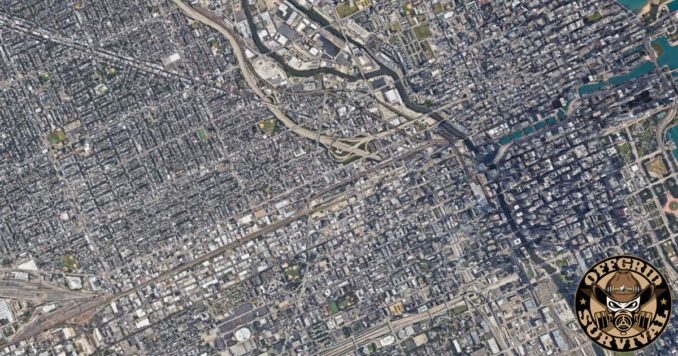
In order to be able to extend your stockpile of supplies, you need to start doing some basic recon on your local environment. Download or buy some detailed maps of your local area, including all areas that you have identified as Bugout locations, and then pull up a satellite view of the areas on Google Maps or Google Earth.
You are going to want to conduct a detailed study of your local environment, and plot out all the routes you can take to find various supplies during extreme emergency situations. When studying the satellite view of the area, you are going to want to look for the following things.
Look for local water sources
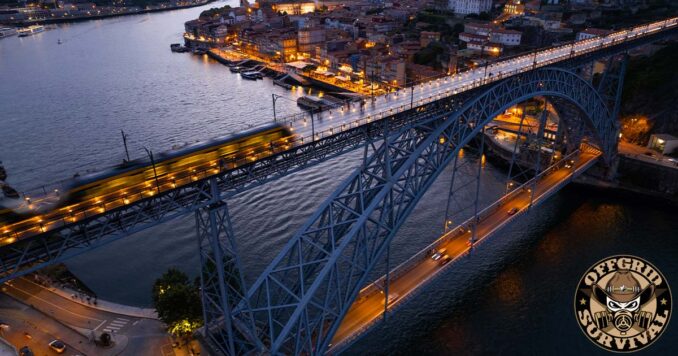
Plot out nearby ponds, streams, rivers, wells, or any available water sources in your vicinity. Make detailed notes on proximity to your location, the amount of water you can access from each source, and the possibility of using the water source for bathing or washing clothes.
Things you should consider:
- How far are these sources from your location?
- How much water can you obtain from the source?
- Are there water sources where you can bathe and wash clothes?
- What are the risks associated with obtaining water from the source?
- Are there safety issues that you may encounter, and how will you overcome them?
- Can you stay hidden along your route?
CARRY A WATER SPIGOT KEY:
On a side note, I advise always carrying a Multi-tool and a Water Spigot Key in your Emergency Bags. Most commercial buildings have outdoor water faucets, but most of them have the handles removed to keep the homeless from using them. During an emergency, having a water spigot key can help you gain access to these faucets. Just keep in mind that you are taking water from someone else, so it should only be done in an emergency and you need to be discrete. I like the Superior Tool 4-Way Key, it fits Stopcocks, Sillcocks, and Valves
Look for areas where you can find food
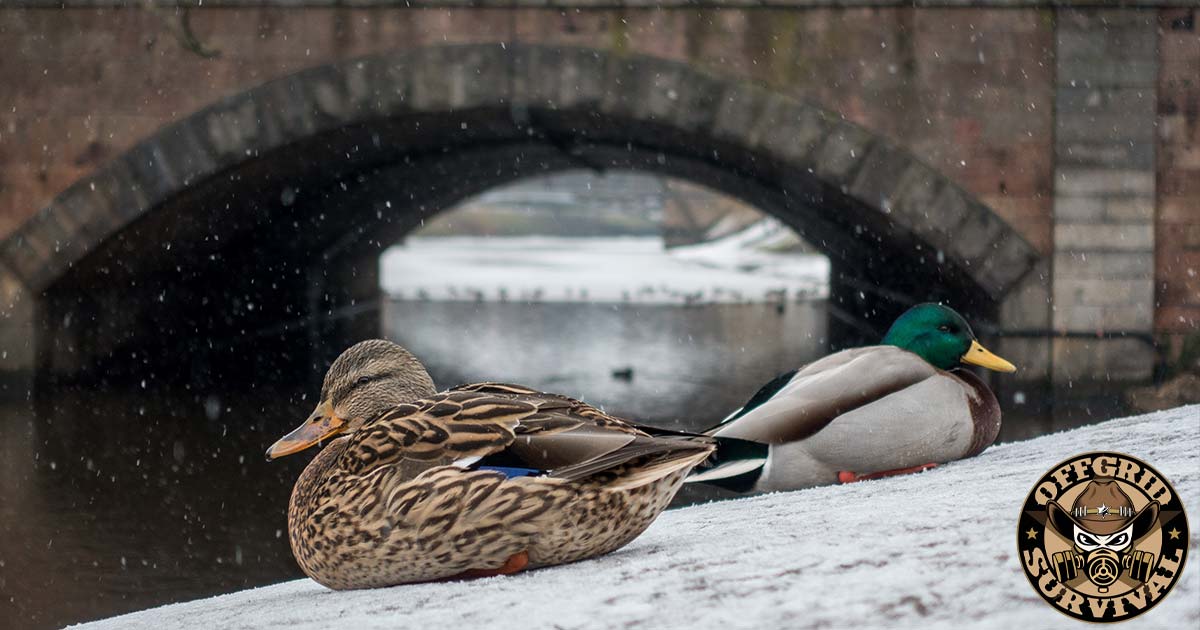
Believe it or not, even big cities are filled with ways to obtain wild food. While it’s not going to be as easy as it might be in areas filled with game, there are probably thousands of different opportunities available to you if you know where to look.
- Where can you find wild game around your area? Are there local parks that have ducks, rabbits, squirrels and other small animals?
- Are there local fishing holes? Even in large urban cities, there are numerous places to catch fish. From local rivers and streams, to small park and golf course ponds, take note of all areas that may contain fish, crawdads and frogs.
- Are there areas where you can easily set traps & snares? Keep in mind, this should only be done in an extreme survival situation, and is probably illegal any other time.
- What are the edible wild plants in your area? Start paying attention to what plants are in your neighborhood, even in the city there are hundreds of wild edibles.
- Are there farms in your area or local community gardens?
- What are the risks associated with transporting food in your area?
- Are there safety issues that you may encounter, and how will you overcome them?
- Can you stay hidden along your route?
Plot out all escape routes, and places where you can hide along your trails.
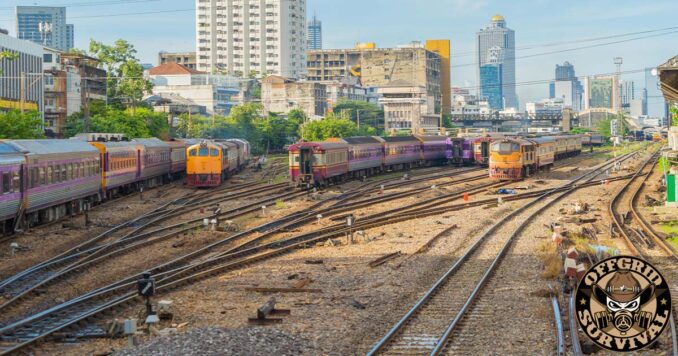
Having multiple escape routes is extremely important, and should never be overlooked. When plotting out your resupply routes, make sure you study your escape routes, and know them well!
- Find routes that have multiple escape routes via the original trail.
- Look for local hiking trails in your area?
- Are there train tracks in your area? There might be a good way in and out of the city.
- How easy is it to stay hidden while walking along your route?
- Is there a river you can safely follow?
- Make sure you also know where to find food and water along your escape routes.
Urban Survival Planning and Considerations
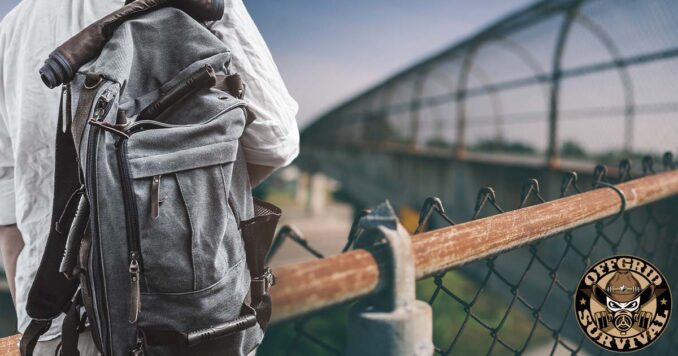
During any long-term urban disaster, every advantage you can give yourself, including having a foolproof urban survival plan, can be a matter of life or death. Along with securing water and food sources, there are some other considerations you need to keep in mind.
Sanitation and Hygiene: Maintaining proper sanitation and hygiene is essential in an urban setting. Create a sanitation plan that includes waste disposal and personal hygiene procedures. Stock up on sanitation supplies like trash bags, disinfectants, soap, and toilet paper.
Communication: During emergencies, cell networks and communication systems may fail or become overwhelmed. Make sure you have alternative communication methods, such as walkie-talkies, ham radios, or satellite phones, to stay in touch with family and gather detailed information on what is going on.
- Check out the HamRadioPrepper.com article: Communications Monitoring: The Importance of Radio Monitoring and Intelligence Gathering During Crisis Situations.
Security and Defense: Even during the so-called good times, urban areas are often a disaster zone filled with criminals and scammers looking for their next victim. During disasters, these areas will become even more volatile, attracting opportunistic looters or desperate people who failed to prepare. Prioritize your security by strengthening your home security, setting up early warning systems, and developing a defensive plan in case a threat penetrates your safety zone.
Medical Supplies: Accidents and injuries can happen without warning, and medical assistance might be unavailable or delayed. Make sure you have a good first aid kit and learn basic medical skills to treat minor injuries and ailments.
- MY MEDIC: MyFAK Large Medical First Aid Bag Review
- Prepping with Medical Problems: How a person with Health issues can Prepare for Disasters
- Top First-Aid Skills & Resources for Treating Medical Emergencies during a Disaster
Bartering and Trade: During prolonged survival situations or an all out economic collapse, currency might lose its value. If that happens, bartering will become a valuable skill to have. Consider items you could trade for essentials, such as food, water, or medical supplies. Items like batteries, lighters, liquor, and personal hygiene items might be highly sought after.




Have to have a map (and compass!)
I recommend finding a good area map and getting it laminated.
In my experience, the map WILL get wet and WILL deteriorate if you do not. Putting it in a plastic bag is not good enough – your life (and those of whom rely on you) may depend on it.
You can also find decent area streetmaps that are pre-laminated and foldable – they cost a bit more, but are 100% worth it.
USGS maps are nice – http://store.usgs.gov
Make sure you get an appropriate scale for the distance you need to have coverage – other useful maps could be city plans and topo maps.
What absolutely essential skills will be necessary to establish a tenable working basic society after a complete breakdown of our world?
seriously, a compass for urban survival? If people are so out of touch with their surroundings, or can’t tell where they are based on a map, they aren’t going to survive anyway. They won’t need a compass unless they’re out away from urban areas and likely in places they aren’t familiar with.
apparently youve never been to a war torn country where buildings have been demolished, streets are full of rubble, and there are no identifiable terrain features because everything has been destroyed. So your comment is fairly worthless.
Kim, have you ever BEEN to Suburbia? xD
To Kim: from 2010:
To say one doesn’t need a compass in an urban environment is naive. If you’ve ever seen the destruction left by a tornado in a neighborhood, you know there are many people who can’t find their own homes because the homes are a pile of rubble blown into another area of town. Streets are covered with debris and everything, landmarks and all, are sometimes, totally unrecognizable.
I’m thinking that if you don’t have a BOL, having enough supplies to hunker down untill things shake out and then cautiously move out (if you see that the resources won’t hold out) would be a plan.
Practice, practice, practice. Include your entire family so everyone can help. Survival should not depend on just one person knowing what to do. Make lightweight backpacks for everyone in your immediate family. Fill them with survival tools, like maps, magnifying glass, dried food, water purifying tablets etc. If disaster hits everyone grabs their backpack before leaving. There are some great things on the market to put into your backpacks that make survival less challenging.
OP: Good thoughts especially on the wild foods imho.
Many wilderness skills are transferable to an urban/suburban setting but get overlooked in favour of where the cheapest xyz can be found. Most people have no idea of the amount of wild edibles they’re surrounded by.
Personally I’d be dubious of advocating raiding gardens or farms it sounds like a good way of getting shot, however all resoucres should be noted and exploited if safe to do so.
knowing where you are is the first step in not being LOST…. no one doesn’t need a compass…..but i do carry one in my pack……
Believe it or not some urban areas give free maps, like the bus system or subways have transit times but have very subtle maps, in the valley here in California we have free semi-laminated maps. Just to add that. When it gets real bad, looking for water-towers, even a fish tank can save your life… I would remember pet stores and putting tarps, buckets, bowls or whatever to catch rainwater if possible. I have a 15 gallon fish tank because I feel natural disasters can come quickly and this might save my 3 person household.
I think that going Mad Max will be suicide.The best bet would be to harden your house or apartment. Steel doors with a fox police lock window bars ete. Let things calm down.
As the food and energy runs out the looters will move on. A semi-auto 12ga. with buck and ball set-up for combat will be a good deterrent. Peppper spray, baseball bat or a shovel are good if you are fit to deal with pesky people, remember the lights might go back on some day.
So now What? When I get up in the morning the first thing I have to do is feed the cat…have a months wet food on hand. Next light up a smoke. Next take a dump now you need a portable toilet with bags that gel the waste. Also Shut off your sewer line (make plans before hand) and throw dodo bag out window or bury in yard. Of course you have food I like cans they last for ever and don’t need water. Exercise, read, listen to the radio, and reconnect with your wife. I can tell you I did. During 9/11, black outs, Irene and Sandy and never felt closer to my old lady. Good luck on our next adventure the coming pandemic!